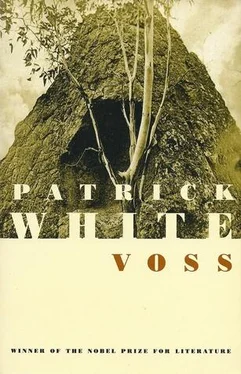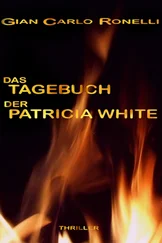Voss took the book. Then, he hesitated, as if about to look in a mirror and discover the deformities he most feared.
Never one to be advised by prudence except spasmodically, he did look, of course, and was at once standing in the terrible arena of childhood, deafened by the clapper of his own heart. These are the poems of a maniac, he protested rather primly, to protect himself. If the book had not been nailed to his hands, he might even have subjected the poet to some act of brutality. Instead, he had to read, one poem in particular which Le Mesurier had, in fact, called Childhood . Under the word was drawn a line so deep it defended like a moat.
Voss read:
When they had opened us with knives, they took out our hearts. Some wore them in their hats, some pressed them to keep for ever, some were eating them as if they had been roses, all with joy, until it was realized the flesh had begun to putrefy. Then they were afraid. They hung their flowers upon a dark tree, quickly, quickly.
As for the children, they break off their tears and put them in the parents’ hands. How the tears of parents flow, their innocence returned. The dead, red flowers go gaily on the water. Beside the river, a white tablecloth is spread to celebrate the feast of children. Everyone is chattering. Bees are bumbling down the golden tunnels. Sweets of honey bribe the children to forget. Sticky mouths no longer care. Children soon forget from whom they have learnt to use the knife.
There is another side of the house on which the pine-trees stand. Contradictory messages arise, some in songs of long, low voices, some in harsh bark. We carve our intentions, but lose the key. So the trees are full of secrets and moss.
It is not known that we shall rise above the trees any afternoon we choose. We are only waiting to pin the calico wings on our backs. Parents and governesses assemble to watch, and some old people, who do perhaps see. We run, and flap, and crow, and rise — one foot? Everyone applauds, and pretends, and disperses, unaware that we have flown above the pointed trees. We enjoy the immense freedom of dreams, in which nobody believes, except as a joke, to share on coming down to breakfast.
The house of nettles is sadder. It is choked with nettles. They are growing high beneath the windows. The plaster is falling from the cornices. In the summer afternoons it rains.
Men and women exchange ideas, and grow exasperated; they cannot lean farther forward, or they would. They accept that bread-and-butter knives do not cut, and have come provided with others, which are waiting in the bedrooms. Have you noticed the veins on the thick, thinking necks?
Children are not expected to think, but are allowed to suffer, and rehearse the future, even to practise kisses on the cotton counterpanes. In at the windows floats the scent of hot, wet nettles and the long summer. The yellow dressing-table drawers are smelling of emptiness. We have not aranged our things, who will not be staying long in this house.
O childhood of moonlight and monkey-puzzles, and the solid statues! How solid, I broke off an arm to prove, and the smell of the wound was the smell of gunpowder and frost. Often the footsteps were not mine that fell along the gravel paths, but yew and laurel intervened; other voices would carry my song out of my control; the faces were not the faces I knew. All were turning gravely in the dance, only I was the prisoner of stone.
When I no longer expected, then I was rewarded by knowing: so it is. We do not meet but in distances, and dreams are the distance brought close. The glossy mornings are trampling horses. The rescue-rope turns to hair. Prayer is, indeed, stronger, but what is strong?
O childhood, O illusions, time does not break your chain of coloured handkerchiefs, nor fail to produce the ruffled dove….
During the reading of the poem, Voss hated and resented it. As mad people will turn in the street, and stare, and enter into a second mind, and mingle with the most personal thoughts, and understand, so this poem turned upon the reader, and he was biting his nails to find himself accused.
If he continued to glance through the notebook, and peer at the slabs of dark scribble, on the smudged pages, with the fluffy edges, he no longer did so with enthusiasm. To be perfectly honest, he did not wish to see, but must. The slow firelight was inexorable.
So his breath pursued him in his search through the blurred book. At that hour of night, sound was thin and terrible. Even the sleepers, who would stir, normally, and call to one another, were turned to rock, a dust of pale sleep lying on their rigid forms, of pale brown.
Then Voss found the poem, and was tearing the book apart, the better to see it. This poem had been headed by the poet Conclusion , in the same rather diffident hand, with a deep, defensive line scored underneath. He had written:
I
Man is King. They hung a robe upon him, of blue sky. His crown was molten. He rode across his kingdom of dust, which paid homage to him for a season, with jasmine, and lilies, and visions of water. They had painted his mysteries upon the rock, but, afraid of his presence, they had run away. So he accepted it. He continued to eat distance, and to raise up the sun in the morning, and the moon was his slave by night. Fevers turned him from Man into God.
II
I am looking at the map of my hand, on which the rivers rise to the North-east. I am looking at my heart, which is the centre. My blood will water the earth and make it green. Winds will carry legends of smoke; birds that have picked the eyes for visions will drop their secrets in the crevices of rock; and trees will spring up, to celebrate the godhead with their blue leaves.
III
Humility is my brigalow, that must I remember: here I shall find a thin shade in which to sit. As I grow weaker, so I shall become strong. As I shrivel, I shall recall with amazement the visions of love, of trampling horses, of drowning candles, of hungry emeralds. Only goodness is fed.
Until the sun delivered me from my body, the wind fretted my wretched ribs, my skull was split open by the green lightning.
Now that I am nothing, I am, and love is the simplest of all tongues.
IV
Then I am not God, but Man. I am God with a spear in his side.
So they take me, when the fires are lit, and the smell of smoke and ash rises above the smell of dust. The spears of failure are eating my liver, as the ant-men wait to perform their little rites.
O God, my God, if suffering is measured on the soul, then I am damned for ever.
Towards evening they tear off a leg, my sweet, disgusting flesh of marzipan. They knead my heart with skinny hands.
O God, my God, let them make from it a vessel that endures.
Flesh is for hacking, after it has stood the test of time. The poor, frayed flesh. They chase this kangaroo, and when they have cut off his pride, and gnawed his charred bones, they honour him in ochre on a wall. Where is his spirit? They say: It has gone out, it has gone away, it is everywhere.
O God, my God, I pray that you will take my spirit out of this my body’s remains, and after you have scattered it, grant that it shall be everywhere, and in the rocks, and in the empty waterholes, and in true love of all men, and in you, O God, at last.
When Voss had finished this poem, he clapped the book together.
‘ Irrsinn! ’ said his mouth.
He was protesting very gutturally, from the back of his throat, from the deepest part of him, from the beginning of his life.
If a sick man likes to occupy himself in this fashion, he decided.
But the sane man could not assert himself enough in the close cave.
He lay down again on his blanket, and was trembling. His mouth and throat were a funnel of dry leather.
Читать дальше












